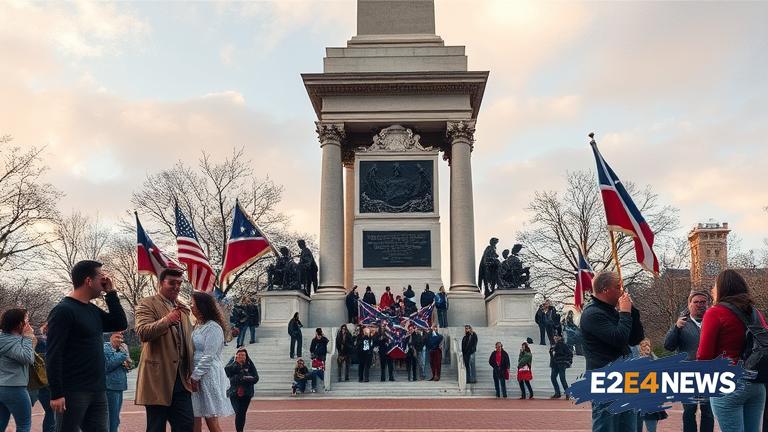The recent return of a Confederate monument to Washington D.C. has ignited a firestorm of controversy, with protestors taking to the streets to demand its removal. The monument, which honors Confederate soldiers, has been a source of tension and debate for years, with many arguing that it represents a painful reminder of the country’s history of slavery and racism. Protestors, who gathered in large numbers, held signs and banners that read ‘Remove the Monument’ and ‘No to White Supremacy’, chanting slogans and demanding that the city’s authorities take action to remove the monument. The protest was peaceful, but the atmosphere was tense, with many expressing their frustration and anger at the monument’s return. The monument’s return has been seen as a setback for those who have been fighting for its removal, and many are now calling for renewed efforts to have it taken down. The debate over the monument’s fate is not new, but it has taken on a new sense of urgency in recent years, as the country grapples with issues of racism and inequality. Many cities and states have already removed Confederate monuments, citing their association with white supremacy and racism. However, others have argued that the monuments are an important part of the country’s history and should be preserved. The issue has sparked a national conversation, with many weighing in on the debate. Some have argued that the monuments are a reminder of the country’s complex and often painful history, and that they should be preserved as a way of learning from the past. Others have argued that the monuments are a symbol of oppression and racism, and that they have no place in modern society. The protest in Washington D.C. is just one example of the many demonstrations that have taken place across the country, as people demand that their cities and states take action to remove Confederate monuments. The movement to remove the monuments has been gaining momentum in recent years, with many notable figures and organizations weighing in on the debate. Despite the controversy, many are hopeful that the protest will mark a turning point in the debate, and that the monument will eventually be removed. The city’s authorities have yet to comment on the protest, but many are calling for them to take action to address the concerns of the community. The debate over the monument’s fate is likely to continue, but one thing is clear: the issue is not going away, and it will continue to be a source of tension and controversy for years to come. The protest has also sparked a wider conversation about the role of monuments and symbols in society, and how they can be used to promote unity and understanding. Many are now calling for a more nuanced approach to the issue, one that takes into account the complex history and context of the monuments. The monument’s return has also raised questions about the role of government in addressing issues of racism and inequality, and how cities and states can work to promote greater understanding and inclusion. As the debate continues, one thing is clear: the fate of the Confederate monument in Washington D.C. will be closely watched, and its outcome will have significant implications for the country as a whole. The protest has shown that the issue is not just a local one, but a national one, and that it will require a national conversation and effort to resolve. The removal of Confederate monuments is not just a matter of taking down a statue, but of addressing the deeper issues of racism and inequality that they represent. It is a complex and difficult issue, but one that must be addressed if the country is to move forward. The protest in Washington D.C. is a reminder that the issue is not going away, and that it will continue to be a source of tension and controversy until it is addressed. The city’s authorities must now decide how to respond to the protest, and whether to remove the monument or leave it in place. The decision will have significant implications, not just for the city, but for the country as a whole. The fate of the Confederate monument in Washington D.C. is just one example of the many debates that are taking place across the country, as people grapple with issues of racism and inequality. The issue is complex and multifaceted, and it will require a nuanced and thoughtful approach to resolve. The protest has shown that the issue is not just a local one, but a national one, and that it will require a national conversation and effort to resolve. The removal of Confederate monuments is a step towards a more inclusive and equitable society, but it is just one part of a larger effort to address the deeper issues of racism and inequality that they represent.
